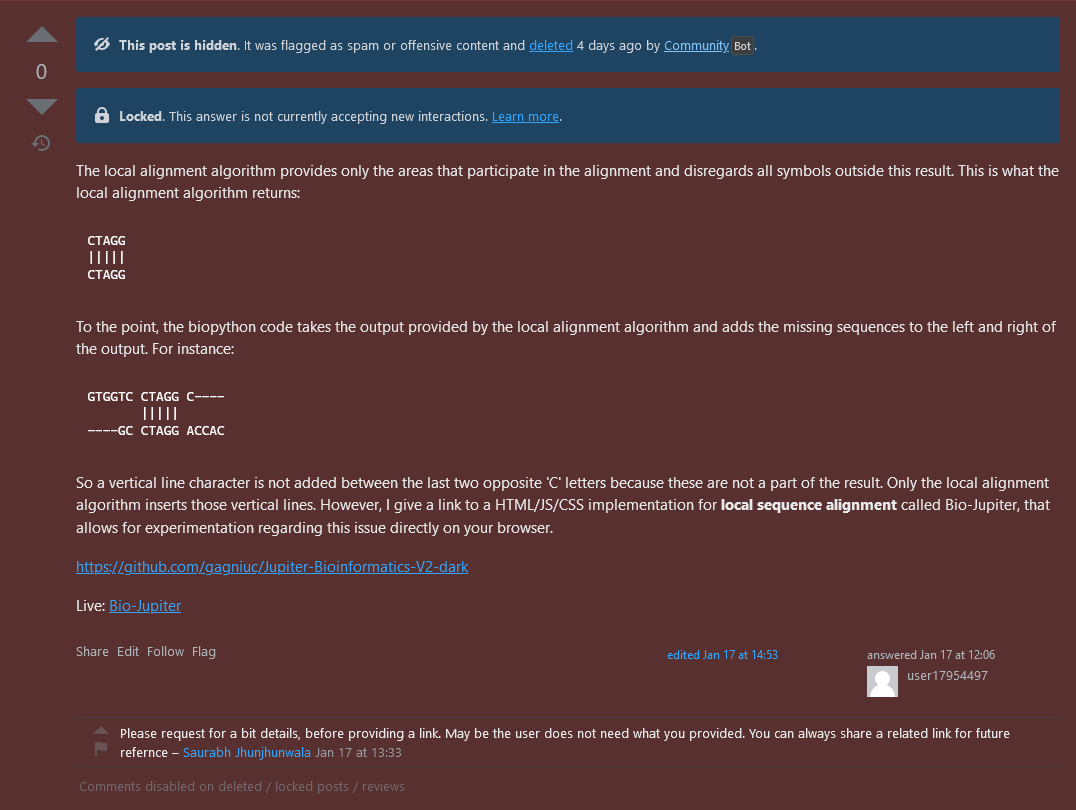I came across a Low quality answers audit yesterday on this answer to Biopython: Local alignment between DNA sequences doesn't find optimal alignment yesterday - screenshot for users with < 10k reputation:
I realised that it was an audit because (unless the answer is obviously NAA, like "I have this problem too!" answers) I always click through to see posts in context when doing reviews, and the answer was not shown below the question, so I passed the audit by choosing the "recommend deletion" option.
I wondered why the post might be an audit:
it's not obviously spam or rude/abusive - the answer appears to be an honest attempt to the question. I have no knowledge of Biopython so can't vouch for its correctness, but that's not within the scope of what I should be doing within the LQA review queue so its correctness (or otherwise) is irrelevant here.
the answer is not plagiarism - I searched for some subsequences of text in the answer, e.g.
- "provided by the local alignment algorithm and adds the missing sequences"
- "local alignment algorithm inserts those vertical lines"
and didn't find any exact hits on Google.
The only two URLs in the answer are to a pages belonging to the GitHub user account (gagniuc). There wasn't anything spammy or offensive on either of those pages.
The links at the end of the answer don't appear to be integral to the answer - the text in the answer preceding "However, I give a link to" seems to be a complete answer (again, I can't judge its correctness) to the question, so this doesn't seem like a link-only answer to me.
The post has a score of 0, so if there had been any spam or rude/abusive flags on there, there were at least the same number of upvotes.
The only conclusion that I could then draw was that the user (which was displayed as "user17954497") had been deleted for spam - see, e.g. this question) where Samuel Liew said:
A side effect of a user getting deleted for spam is that all their negative-scored posts are also spam-deleted.
From this position I decided to raise a custom moderator flag on the answer to hopefully prevent others from encountering this audit (I've done this in the past and it's resulted in my flag(s) being marked helpful):
This appears to be a bad audit - the answer appears to be an honest attempt to edit the question, and the only two links are to GitHub (and don't seem to be critical to the answer) so less likely to be spam. It looks to me (not having 10k reputation) that the user might have been spam-deleted for posting loads of links to their own repo (or actual spam).
My flag was declined about three hours after it was raised with the standard comment:
declined - a moderator reviewed your flag, but found no evidence to support it
I can't see that the blunder in my flag text (I had meant to say "attempt to answer the question") would be the reason that the flag was declined - in the context of the rest of the text, I'd have thought it was otherwise clear.
In retrospect, the comment on the answer indicates that the answerer might have just posted a link to their repository, but the answer was edited just over an hour later (presumably to provide more information, and to possibly not make it a link-only answer).
Was the answer a good audit for the Low quality answers review queue?
If not, why was my flag declined?
After this question was asked, I encountered another audit for a deleted answer by the same user for an answer on another question (screenshot for users with <10k reputation). As always, I clicked the link to see the answer in context and didn't see it, so passed the audit. This time, the deleted answer had a score of 1 and had a comment from the OP. Again, the answer was "flagged as spam or offensive content" and deleted.
As the answer is linking to the same GitHub account (gagniuc), and refers to a book by "Paul A. Gagniuc", it seems plausible that the author of the book and the owner of the GitHub user account are the same person - presumably the same person behind the deleted Stack Overflow account. If so, this answer would appear to count as undisclosed affiliation.
In this case, a beady-eyed reviewer would spot that the referenced book and the GitHub account contain the same name, and might have searched for plagiarism by doing a search (e.g. for "INFORMATION CONTENT (SELF-SEQUENCE ALIGNMENT)") and found that the code appeared to be copy/pasta from the book - the relevant page in Google Books here. The code is copied without making it clear that it's been copied so its presence in the answer would either be plagiarism or undisclosed affiliation.
